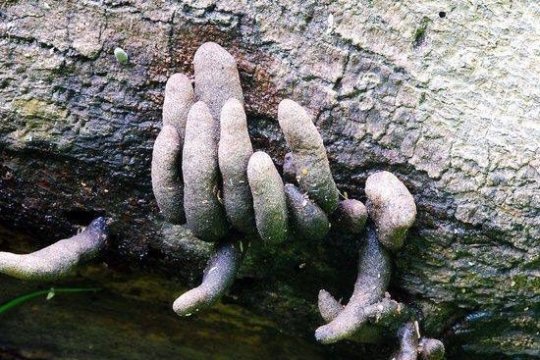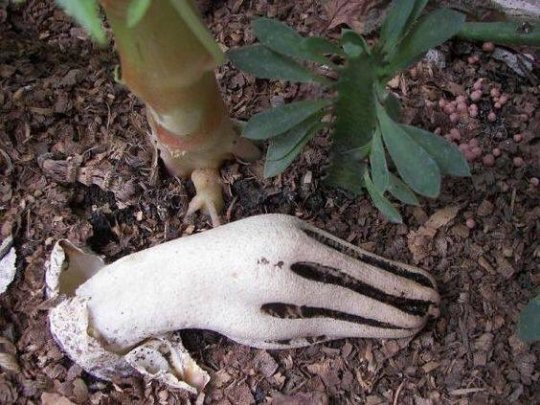Queer trans masc learning primarily about Wales, Welsh witchcraft, Welsh polytheism, Welsh language, Welsh folklore, and Welsh mythology. I reblog things about witchcraft, magic, and paganism in general. This is a sideblog; main is glynmostyn.
Don't wanna be here? Send us removal request.
Text
"Some claim religion is the bane of humanity but that is incorrect. The true bane of humanity is fanatism, be it in the form of a god, an object, or an ideology."
55 notes
·
View notes
Text
Watched a New Age lady ask her spirit guide to give her a message through ChatGPT, said message was identical to every other vague and insipid message New Age channelers put out there, and of course she and the lady she was streaming with acted like this was Oooooohhhh Deep Spiritual Wisdom.
91 notes
·
View notes
Text
"The substances behind the slimy strings from okra and the gel from fenugreek seeds could trap microplastics better than a commonly used synthetic polymer.
Texas researchers proposed in 2022 using these sticky natural polymers to clean up water. Now, they’ve found that okra and/or fenugreek extracts attracted and removed up to 90% of microplastics from ocean water, freshwater, and groundwater.
With funding from the U.S. Department of Energy, Rajani Srinivasan and colleagues at Tarleton State University found that the plant-based polymers from okra, fenugreek, and tamarind stick to microplastics, clumping together and sinking for easy separation from water.
In this next stage of the research, they have optimized the process for okra and fenugreek extracts and tested results in a variety of types of water.
To extract the sticky plant polymers, the team soaked sliced okra pods and blended fenugreek seeds in separate containers of water overnight. Then, researchers removed the dissolved extracts from each solution and dried them into powders.
Analyses published in the American Chemical Society journal showed that the powdered extracts contained polysaccharides, which are natural polymers. Initial tests in pure water spiked with microplastics showed that:
One gram of either powder in a quart (one liter) of water trapped microplastics the most effectively.
Dried okra and fenugreek extracts removed 67% and 93%, respectively, of the plastic in an hour.
A mixture of equal parts okra and fenugreek powder reached maximum removal efficiency (70%) within 30 minutes.
The natural polymers performed significantly better than the synthetic, commercially available polyacrylamide polymer used in wastewater treatment.
Then the researchers tested the plant extracts on real microplastic-polluted water. They collected samples from waterbodies around Texas and brought them to the lab. The plant extract removal efficiency changed depending on the original water source.
Okra worked best in ocean water (80%), fenugreek in groundwater (80-90%), and the 1:1 combination of okra and fenugreek in freshwater (77%).
The researchers hypothesize that the natural polymers had different efficiencies because each water sample had different types, sizes and shapes of microplastics.
Polyacrylamide, which is currently used to remove contaminants during wastewater treatment, has low toxicity, but its precursor acrylamide is considered toxic. Okra and fenugreek extracts could serve as biodegradable and nontoxic alternatives.
“Utilizing these plant-based extracts in water treatment will remove microplastics and other pollutants without introducing additional toxic substances to the treated water,” said Srinivasan in a media release, “thus reducing long-term health risks to the population.”
She had previously studied the use of food-grade plant extracts as non-toxic flocculants to remove textile-based pollutants from wastewater and thought, ‘Why not try microplastics?’"
-via Good News Network, May 10, 2025
16K notes
·
View notes
Text
Reminder that even if a religion is open, it can still be appropriated and bastardised.
You can't just cherry pick and choose titles, practices, deities from different practices/religions you think sound cool to use however you like without any understanding or respect towards the cultural/historical/religious context.
492 notes
·
View notes
Text
Sitting on my couch doing magical embroidery in my underwear is what life is about actually
1 note
·
View note
Note
I have a stupid question. How do you find out about current history scholarship and research? I am sick of reading books I've read a hundred times and were published decades ago. Is there like a forum or something where historians share research or lectures or things?
Not stupid at all!
The key is 1) knowing which sources provide the most up-to-date information, and then 2) using the appropriate strategy to access them.
Conference and lectures
Conferences are where you find the most cutting-edge research – usually work that has not been published yet, or is still in progress. Accessing conferences can be both expensive and difficult (if they're limited to people with certain affiliations, for example), but there are also conferences that are free for the public, and ones run by groups like the Organization of American Historians that are reasonably priced for the digital attendance option. You can browse conference programmes (here is the OAH's 2024 version) to at least find the names of academics relevant to your field of interest, which will help with the kinds of searches you will want to conduct below.
Finding these is a mix of luck and effort. You can set a search alerts on various platforms, literally just do a search for "[topic] academic conference", find relevant organisations and subscribe to their newsletters for updates, or do some browsing on social media. I found History Symposium (free, current, deep-dive history lectures and a virtual conference) because of something shared here on Tumblr. Following the Instagram account of the Powder House in Charleston keeps me updated on their history lecture programming (which host virtual talks including showcasing new research on the US colonial era). Then there are institutions like the Royal Museums Greenwich who publish a range of high-quality historical content on their YouTube account (they have a good series on black history and the Transatlantic slave trade, as well as a fascinating recent lecture by a historian on the queer history of the British navy, which I also found here on Tumblr).
Academic journals
Journals are where you get the most recent published academic scholarship. A journal article generally is a fairly narrow/focused exploration of a topic that adds something new to the ongoing academic conversation (e.g., a new discovery, a new analysis of existing material, a new theoretical perspective, a challenge to a previous author's work).
Other useful kinds of journal content are book reviews, as well as "review" articles, which summarise and synthesise recent research in a field – as well as newly arising questions and research directions.
Getting your hands on articles requires two steps: 1) finding the research, and 2) accessing the research.
Finding articles
For better or worse, the best generalist search tool for journal articles is Google Scholar – it allows you to search across hundreds of databases and independent publishers for relevant content.
If you're a member of a university library (not necessarily staff or student – check if your library allows external membership), it will have its own search tool which allows you to find material in the databases and journals that the university is subscribed to. Individual databases, archives or publishers (think JSTOR) will also have their own internal search.
My advice is to start your search as narrowly as possible, and then expand out slowly if you don't find anything relevant. So, for example, I might start my search with "same-sex relationships london 1780s", and if nothing comes up, I might broaden it out to "england" or "late eighteenth century", and so on.
The other thing to do is follow citations (i.e., who referenced what?). You can travel "backwards" through the literature by looking at the reference lists of books or articles you already have (in other words, which works the author used to base their research on).
But you can also travel forwards – the "cited by x" link below a reference on Google Scholar is your friend, because it shows you who used that particular source in their (by default, more recent) work.

Accessing articles
Unfortunately, a lot of academic research is gatekept by the academic publishing industrial complex – not by academics themselves, to be clear. This results in those ludicrous charges for single papers:

(And $30 is hardly the upper limit...)
But hope is not lost! You still have some options if you're willing to do a bit of work.
1) Sometimes, if you're lucky, the article will be freely available online. In Google Scholar, for example, check for the "PDF" or "HTML" link to the right of the title:

Some entire journals are freely available (usually called "open access") – one example is the Journal of the American Revolution. You can also search on DOAJ for open-access-only articles and journals.
2) I've also occasionally found the article just by googling "[article name] pdf". Some scholars will make these available for free on their personal websites, for example.
3) You can also try contacting the scholar directly through a platform like Academia.edu. Find the article there, and check if there is a "request full-text" option on its page (or, even, if the full text version has already been posted).
4) For slightly older articles, try searching on JSTOR, which gives anyone with an account free access to 100 articles a month. (I say "older", but there's even scholarship from 2024 on there these days.)
5) If all else fails, definitely do not type "sci hub" into your search engine and check there. That would be bad and naughty and very, very sexy of you. I repeat, do not do this. 🤫
Academic books
Books are not usually a great source of super-current research, both because the format doesn't lend itself to it and the publishing cycle can be very long, but they can be an excellent source for a decently recent and detailed overview of the topic. Note that you specifically want academic books here (not the ones in the "history" section of your local chain bookstore).
If you've done some digging in journal databases, you should have a good sense of which authors are writing about the topics you're interested in. Find their websites or social media feeds and subscribe to get updates on their latest work. For example, historian and Tumblr darling Joanne Freeman has a website with links to her books, lectures and podcast, as well as other media. The Museum of the American Revolution has a "Read the Revolution" speaker series featuring newly published books on relevant topics (and they're certainly not the only museum or public institution to do this). Their newsletter will keep you updated on the upcoming sessions, and the website often has a free recording of the talk available.
The prices can be quite extortionate, so again, see if you can find a free version online using the methods above. You might also have some luck finding the book on Archive.org (which might allow you to loan it out for free for an hour at a time) or Google Books (which sometimes shows you a decently large preview). Definitely do not type "libgen" into your search engine and try to download the book form there.
In summary...
There's a lot out there. A bit of persistence and a lot of searching (on databases, social media and the internet in general) will open up a huge spectrum of intereting and relevant resources!
207 notes
·
View notes
Text
I sometimes wonder now many people would go in for a Paris Catacombs type burial situation if that was an option in their home town. No marked grave, no memorial, just having all the flesh chemically stripped from their skeleton, which is then disassembled and incorporated into an anonymous wall of bones in some kind of fucked up underground labyrinth where people can walk through and look at the bones. I have to imagine there's a non-trivial market for that.
1K notes
·
View notes
Text
Having some thoughts about compulsory sexuality, especially how posts about sex positivity vs censorship have an unfortunate tendency to cast people who are less willing to engage with sex as the cause and the symptom of puritanism when puritanical people are usually pretty pro-sex (within very narrow parameters that they weaponize against everyone else).
Tl;dr: Ending stigma around sex = Good. Implying less sexual people are losers / bad queers / oppressors = No thanks.
3K notes
·
View notes
Text

(Source)
This is EXACTLY why we beg y’all to boycott HP, especially the reboot. Anywho, gonna take advantage of the tag inevitably trending by listing pro-LGBTQ+ groups to support and invest:
Mermaids
The Trevor Project
InterACT
The National Black Justice Coalition
Lavender Phoenix
Black AIDS Institute
GLAAD
National Indigenous Women’s Resource Center
Lambda Legal
Queer the Land
Act Up NY
Human Rights Campaign
FOLX HELP
Feel free to add more charitable organizations below! Oh and one more thing: DO NOT HARASS THE KIDS CAST ON THAT SHOW, or you’re equally as bad as Jowling-Knowling-Rowling.
6K notes
·
View notes
Text
This was well-received on Instagram and the clock app, so here's the easiest way to acquire red brick dust for Southern folk magic. You absolutely do not need to pay $20 for a tiny bag online, I promise.
342 notes
·
View notes
Text
It's been years since I started seeing nutrient flows constantly in my daily life, and the more I study agriculture, the more I see them.
See, every time you harvest something, you take the nutrients in that item away from the soil, and they go somewhere else. When I put a banana peel in my compost bin, I think (a little gleefully) about how I've just added an exotic, different profile of nutrients to my own property--but I also think about that distant banana plantation that lost tons of nutrients per year to US grocery stores, and I wonder what they replaced those nutrients with.
The farmer across my field grows corn, which gets harvested for feed. Corn is a nitrogen-hungry crop. Every year, that corn sucks up nutrients, which get harvested and shipped away. The farmer, being a conventional farmer, mostly replaces those with a conventional fertilizer. Nitrogen is often applied to fields in the form of ammonia fertilizer, which is made via a process that binds nitrogen in the air with hydrogen from natural gas. This feels like a vast resource, but of course we know it's not inexhaustible and not without cost.
Ideally, said farmer does soil tests and applies a carefully considered amount of ammonia. It is taken up by the growing plants and relatively little is lost. Possibly (often), though, some of the ammonia is leached out via rain and ends up in waterways, where it causes plant overgrowth and algal blooms, which harm the waterways in several ways, and turn those nutrients from a resource into a contaminant.
Meanwhile, the corn is also uptaking a variety of other nutrients from the soil which the commercial fertilizer is NOT replacing. Year by year, those nutrients get shipped off to distant feedlots and depleted in the soil. Eventually, those nutrients are gone from my neighbor's field and, quite possibly, languishing in a manure lagoon somewhere in, say, Indiana, where one can only hope it's properly treated and made into compost. But, you know. Not necessarily.
When I buy compost at the store, it's usually based in either cow manure or "forest products". Hopefully, depending on brand, those forest products MIGHT be collected municipal yard waste. Which is pretty good. Those suburbanites don't want their leaves, I do, win/win.
Except that because those suburbanites raked their yard waste, they now need at some point to fertilize their trees, shrubs, and turf grass. Meanwhile, they've eliminated habitat for the many insects that use leaf litter to either overwinter or reproduce. They may not be counting the costs, but the costs don't stop existing.
The ebb and flow of nutrients is something that, in the current system, goes utterly unregarded by most of the people taking part in the process. Even gardeners bring nutrients onto their soils mostly without thinking about the places those nutrients came from. I think in a sustainable world, that needs to change.
Also probably we need to do a hell of a lot more cover-cropping.
6K notes
·
View notes
Text




when the sun gets caught in a tree’s web 🌅 Credit @eric66699999
2K notes
·
View notes
Text
EDIT: YOU SHOULD CARE MORE ABOUT REAL INDIGENOUS PEOPLE
btw i’m not pushing like “boycotting the lilo and stitch is the greatest act of activism you can do in today’s climate”
i’m just like “not watching this movie is literally the bare minimum you can do to help not push an imperialistic tourist agenda that’s destroying native Hawai‘i. just don’t.” and im already pre-irritated bc i know like thirty people are gonna be like i knowww but. i just wanna.
Hawaiian Sovereignty Movement:
Current Issues Impacting Native Hawaiians:
Petitions and Donations Supporting Native Hawaiians & Their āina:
43K notes
·
View notes
Text
In 2015, the UK was ranked 1st place, rated 86% for LGBT+ human rights in Europe. Today the UK is in 22nd place, with 46% just ten years later.
When you make jokes about TERF Island and it being some sort of karma for lost empires well maybe take a second to remember people live here. Your friends live here. We cannot escape. There is no where some of us can legally go. We are scared . A 40% drop. 40. How quickly this country has unravelled is deeply horrifying to many.
To my queer brothers and sisters and siblings, hold on. We can make it.
♥️❤️💙💚💛💜🧡
6K notes
·
View notes
Text
non-welsh people stop saying reading welsh makes them think they’re having a stroke challenge
76 notes
·
View notes




